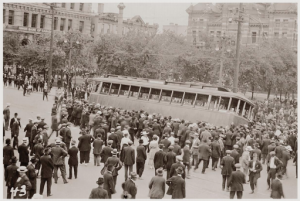
It became an article of faith for the ruling class that the Winnipeg General Strike must be quashed without strikers’ demands being met. Although the Strike Committee maintained order, street demonstrations and mass meetings meant to solidify striker solidarity scared the corporate elite. The city fired the entire police force because its members voted overwhelmingly to join the strikers even though, at the Strike Committee’s request, they stayed on the job. The new anti-strike police could do only so much to repress the strikers’ constant marches and meetings to popularize their demands. Prodded by the Citizens’ Committee that insisted that Winnipeg was in the midst of a Bolshevik Revolution led by aliens, the federal government sent the RNWMP to Winnipeg to aid the city council’s efforts to ban outdoor pro-strike gatherings. The Mounties arrested 10 strike leaders and two OBU organizers on June 17 in an effort to deprive the movement of leadership.
Four days later, in a challenge to government efforts to forbid mass gatherings, there was a massive protest against the arrests in the city’s Market Square. The protesters attempted to stop street railway trains, driven by scabs, from operating, in one case partially or completely tipping over a street car. The mayor read the Riot Act and the RNWMP attempted to disperse the 5000 to 6000 protesters with a volley of shots fired into the crowd. The strikers would label that day, June 21, 1919, Bloody Saturday. The police riot caused the deaths of two men: Mike Sokolowiski, apparently a Winnipeg tinsmith, and Steve Schezerbanowes, a worker from near-by East Selkirk. Twenty-seven other strikers were injured, and 90 men and four women were arrested.
The remaining Strike leadership voted on June 25 to end the strike the next day rather than risk more state violence against workers, and called upon sympathy strikers across Canada to end their strikes but to campaign for release of jailed strike leaders and the dropping of charges against them.
Both the Mathers Commission, reporting in June, 1919, and a Manitoba royal commission on the causes of the Winnipeg General Strike which reported in November, 1919 (though only made public in March 1920) dismissed notions of a revolutionary conspiracy and confirmed that workers had ample reasons for demanding structural changes. The federal commission emphasized unemployment, unstable employment, the high cost of living, government and employers’ failure to allow collective bargaining, a lack of decent housing, the government’s clampdown on free speech and a free press, and lack of educational opportunities for working people. But the trials in Winnipeg proceeded nonetheless, with seven men eventually imprisoned for “sedition.” Those who had precipitated the strike through their oppression of workers faced no charges.
Several convicted men were vindicated by working-class voters who elected them to the legislature in the Manitoba election of 1920. Four leftist MLAs were elected in the 10-member Winnipeg seat (MLAs were chosen by preferential balloting), three of whom were serving prison terms for “seditious conspiracy” at the time, the fourth having been charged but exonerated. Seven other leftist MLAs, supporters of the Winnipeg strike, were elected in seats outside Winnipeg. J.S. Woodsworth, who became editor of the Western Labour News after its editor was arrested on June 17 and then was himself arrested, was found not guilty of seditious conspiracy when it turned out that his allegedly incendiary words came from the Bible. Elected in 1921 to Parliament for Winnipeg Centre, the cradle of the Strike, he attributed his election to those who had jailed him and made him a martyr. He would later become the founding leader of the Co-operative Commonwealth Federation (CCF) in 1932, the forerunner of today’s New Democratic Party, which was founded in 1961.
Strikes in other cities, including Edmonton and Calgary, ended after the Winnipeg Strike Committee announced the end of their strike. As in Winnipeg, the focus turned to a defence of the arrested Winnipeg strike leaders and to politics. In December, 1919, seven of ten elected members on Edmonton city council were men endorsed by the ETLC along with three of the four men elected to the school board. Only three of ten elected council members in Calgary that month were candidates endorsed by Labour. But in 1921, when four Labour members were elected to the legislature, two were from Calgary, one from Medicine Hat, and one from Rocky Mountain. The only Labour MP elected in the province in 1921 was William Irvine from Calgary. Irvine, a Unitarian minister who also worked as a railway labourer, had told the Mathers Commission that “what the working men want today is truly democratic control of industry,” noting that that meant “production for use and not for profit, but it is perhaps more than that. It means at least the worker will find expression. At the present time, he is a cog in the machine, he has nothing to say as to what is to be done or how it is to be done.”
